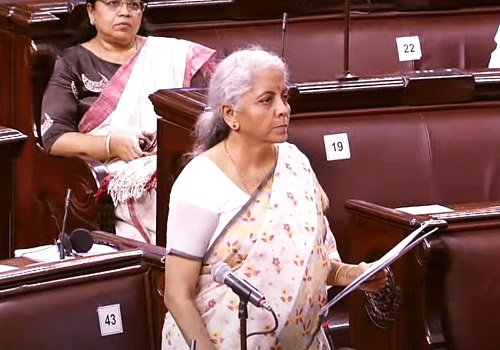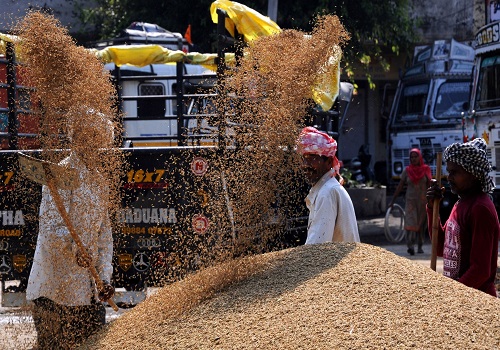India GDP & Fiscal : Private consumption and investments boost growth; Fiscal improves By JM Financial Institutional Securities

Follow us Now on Telegram ! Get daily 10 - 12 important updates on Business, Finance and Investment. Join our Telegram Channel
The double digit real GDP growth (13.5%) looked optically robust but was on the back of favorable base effects. Private consumption crowded government spending while investments (GFCF) contributed to almost half of the GDP growth. Higher imports led by inflationary pressures dragged the economy, merchandise deficit in Q1 FY23 crossed USD 70bn vs USD 49bn pre-pandemic. Services gained the most - within which contact intensive sectors benefitted as the economy functioned at NIL restrictions in Q1. Manufacturing failed to boost the economy, even as PMI expanded 54.4 (Q1 Avg). India’s fiscal situation improved; During Apr-Jul’22, Gross tax revenue formed 31% while fiscal deficit is at 20.5% of FY23BE. We believe risks of spill over of global uncertainties would call for coordinated fiscal and monetary policy efforts.
* Private consumption and Investments boost growth: India’s Real GDP growth rate of 13.5% in Q1FY23 although optically looked robust, was on the back of favourable base effect of Q1FY22 – Delta Covid wave. The GDP print missed consensus estimates (~15%) and the RBI’s 16.2% growth estimate. Growth in government spending was largely missing and was entirely crowded out by private consumption. Gross Fixed Capital Formation (GFCF) representing investments, grew 20.1% YoY, contributing to almost half of the GDP growth. Imports growth (37%) led by high commodity prices, surpassing the growth in exports (15%), dragged the economy. Real GVA growth of 12.7% was led by services sector (17.6%), as Q1FY23 was the first quarter with absence of any Covid induced restrictions across India. Within services sector, major gains were seen in contact intensive sectors like trade, hotels, transport and communication (26% YoY) and Public sector (26.3% YoY). Contrary to expectations of a negative impact of heat wave, growth in agriculture sector (4.5%) was robust while manufacturing sector (4.8% YoY) failed to boost the economy although Manufacturing PMI averaged 54.4 during Q1. Within Industry, gains in construction (16.8%) contributed the most to the overall growth. In nominal terms, the economy (GDP) grew by 26.7%.
* India’s Fiscal situation improves: India’s fiscal position improved substantially in Jul’22, mainly as the sequential fall in expenditure was more than compensated by the fall in revenue. This led to the fiscal situation turning surplus (Rs. 110bn) in Jul’22, while the fiscal deficit for AprJul’22 period constitutes 20.5% of the budgeted figure for FY23. Robust gross tax revenue (Rs. 2.2tn) gives an indication that the government’s annual targets are conservative. On a YTD basis, Gross tax revenue as a proportion of FY23 BE has already crossed 31% - which is the highest. On the expenditure front, the proportion of Capex has almost doubled (19%) since FYTD20. During Apr-Jul’22, Capex of Rs. 20.9tn which currently forms 28% of FY23BE is still lower compared to 30%+ during pre-pandemic period.
* Risks of global spill over remain; Calls for coordinated fiscal and monetary efforts: We believe recent easing in commodity prices and supply chain should start to reflect in the economic activity mainly in manufacturing sector, which is even evident from the manufacturing PMI prints. But the global geo-political situation is still fluid and any escalation would negatively impact the commodity basket, fuelling the already elevated inflationary pressures. The expected slowdown in DM economies could have spill over effects on EM economies. Current fluid situation makes forecasting difficult but going by the RBI’s GDP estimates of 6.2%, 4.1% and 4% in Q2 – Q4FY23, it is evident that growth is likely to taper going forward. But other than the global spill over effects, domestic economy remains resilient as can be seen in high forex reserves, central governments comfortable fiscal situation, uptick in credit cycle coinciding with banks reporting low NPAs and de-leveraged corporates. But we believe any uncertainty would call for continued co-ordinated efforts between the fiscal and monetary policy to manoeuvre through the uncertain environment.
To Read Complete Report & Disclaimer Click Here
Please refer disclaimer at https://www.jmfl.com/disclaimer
SEBI Registration Number is INM000010361
Above views are of the author and not of the website kindly read disclaimer










Top News

Government committed to creating conducive environment for employment generation, economic g...
Tag News

Monthly Debt Market Update, September 2023: CareEdge Ratings





 320-x-100_uti_gold.jpg" alt="Advertisement">
320-x-100_uti_gold.jpg" alt="Advertisement">







